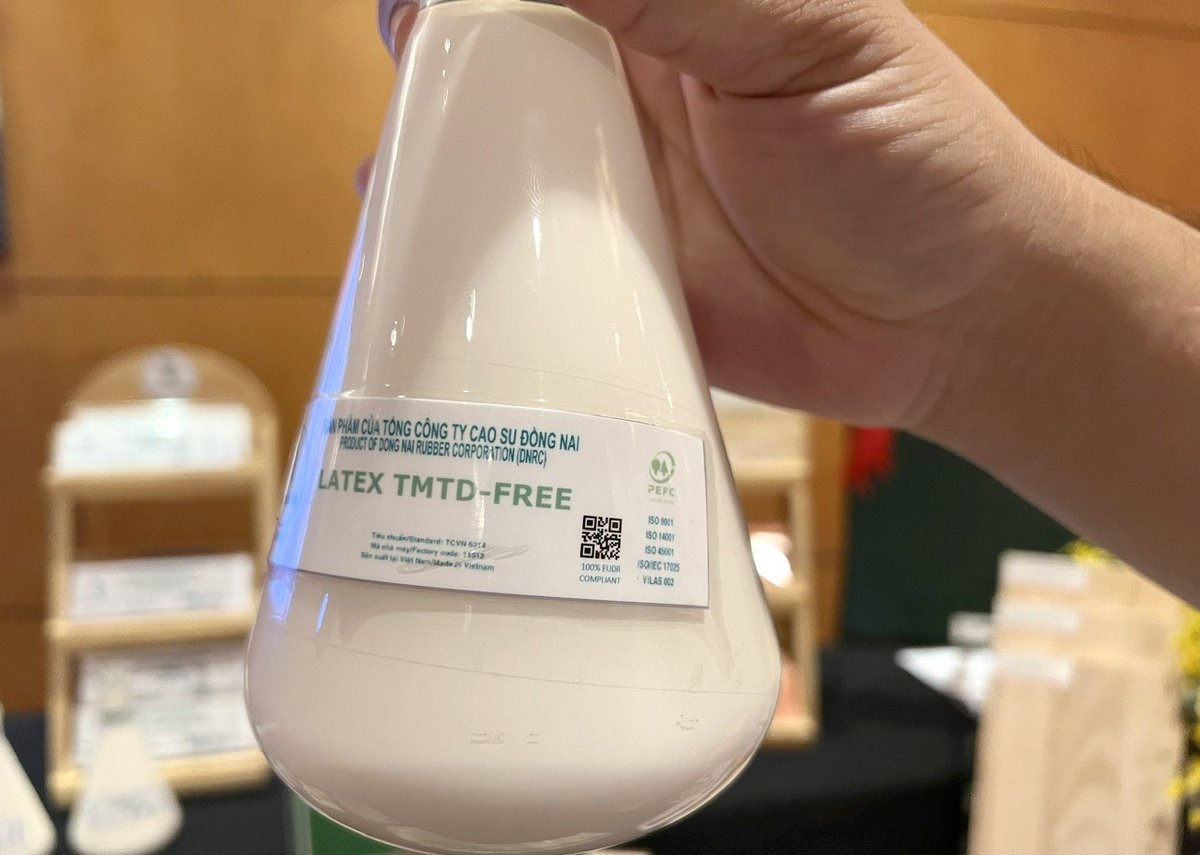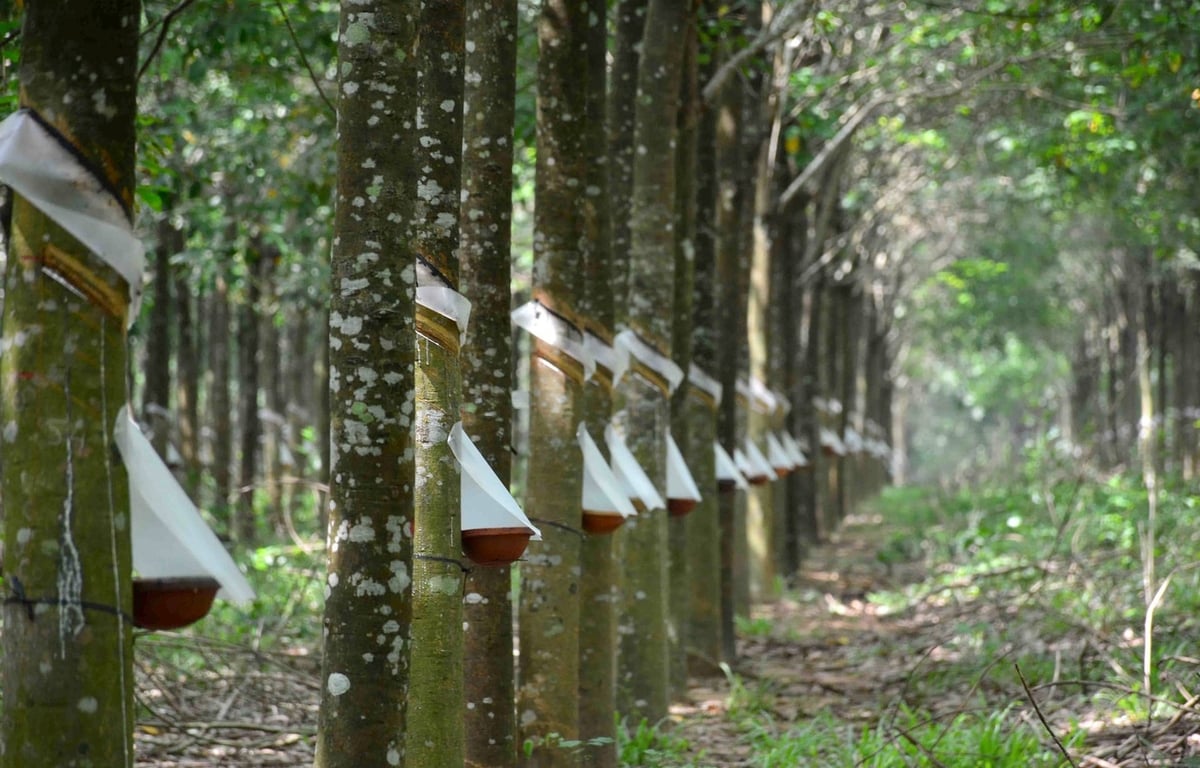December 30, 2025 | 18:39 GMT +7
December 30, 2025 | 18:39 GMT +7
Hotline: 0913.378.918
December 30, 2025 | 18:39 GMT +7
Hotline: 0913.378.918

EUDR-compliant rubber latex from Donaruco. Photo: Son Trang.
Europe is the second-largest export market for Dong Nai Rubber Corporation (Donaruco), accounting for about 16% of the company’s rubber exports, with major markets including France, Germany, the Netherlands, the United Kingdom, and Spain. Therefore, Donaruco is one of the pioneering enterprises in implementing the European Union Deforestation Regulation (EUDR).
Complying with the EUDR poses a significant challenge for exporters of agricultural and forestry products, as the regulation requires a stringent and transparent traceability system. However, it also presents an important opportunity for Donaruco to demonstrate its commitment to sustainable development and enhance its international competitiveness.
In early December 2024, Donaruco, along with two other companies, Dau Tieng Rubber One Member Co., Ltd. and Chu Se Kampong Thom Rubber JSC, was announced by Vietnam Rubber Group (VRG) as among the first three units within the group to fully meet the EUDR requirements and receive customer acceptance.
To comply with the EUDR, Donaruco has successfully developed a raw material traceability system (DNRC-Traceability) based on both web and mobile app platforms, integrated with the DNRC digital mapping system (DNRC.GIS).
The DNRC.GIS mapping system and DNRC-Traceability platform are powerful tools that allow Donaruco to effectively manage its extensive plantation area of about 34,000 hectares. These systems help track the current status of plantations and accurately identify the origin of each batch of rubber latex, including the harvest date, processing date, product quality, and exact geographic location. This ensures full compliance with the EUDR.
The adoption of digital technology also significantly reduces operational costs, increases management flexibility, and facilitates data integration for internal reporting, audits, and external assessments by international certification bodies.
As Donaruco still needs to purchase a considerable volume of latex from smallholder farmers annually to supply its three processing plants, the company has implemented various solutions to assist these farmers in collecting necessary information, mapping plantations, and managing raw material sources in accordance with the EUDR. Donaruco offers technical support and shares benefits with smallholders who comply with the regulation.
In addition, Donaruco frequently organizes workshops for smallholders, providing training on plantation care and latex preservation, offering preferential financing, and supporting social welfare programs.
These initiatives not only enhance the capacity of local communities but also strengthen Donaruco’s sustainable relationship with them, advancing the goal of building a rubber industry that is sustainable, transparent, and responsible.

A rubber plantation of Donaruco. Photo: Son Trang.
By successfully establishing a traceability system, Donaruco has become the first unit within VRG and the Vietnamese rubber industry to fully comply with EUDR requirements.
Since the announcement of its compliance with EUDR, Donaruco has exported thousands of tons of rubber that meet the regulation. It is estimated that by the end of 2024, about 1,600 tons of Donaruco's EUDR-compliant rubber will have been successfully exported to Europe. According to General Director Do Minh Tuan, sales of EUDR-compliant rubber products have been strong since the beginning of the year.
Meeting the EUDR requirements not only prepares Donaruco to expand rubber exports to Europe once the regulation takes effect, but also boosts the company's reputation in global markets, drawing increased attention from major markets such as the United States, Japan, South Korea, and China.
The increase in export value despite a decline in volume indicates that the market is recognizing the true value of sustainable rubber, especially products that meet EUDR standards. This is a positive signal showing that Donaruco's development strategy is on the right track and should be further expanded across the entire industry.
Many potential customers from these markets have proactively reached out to express interest in forming stable, long-term supply chains with Donaruco, thanks to the company’s traceability capabilities and environmental commitments.
To date, Donaruco has 11,035 hectares of rubber forest certified for sustainable forest management under VFCS/PEFC-FM standards, accounting for 34.8% of the company’s total plantation area. In addition, all three of Donaruco’s rubber processing plants have received PEFC-CoC (Chain of Custody) certification, with a total capacity of 40,000 tons per year.
Rubber exports in the first half of this year have shown strong growth in value. According to Vietnam Customs, in the first five months of 2025, rubber exports reached 550,000 tons, worth USD 1.04 billion, down 4.1% in volume but up 21.7% in value compared to the same period in 2024.
Translated by Huong Giang
/2025/12/29/2812-1-182339_699.jpg)
(VAN) The price of mangrove forest carbon credits is high because this forest type not only delivers significant environmental value but also plays a crucial role in addressing other issues.
/2025/12/29/5840-0-115141_514.jpg)
(VAN) From 2026, many EU markets will require shrimp to be electrically stunned before ice immersion, forcing exporters to change technologies to retain market share.
/2025/12/28/4951-2-104623_113.jpg)
(VAN) Rubber exports are forecast to remain under downward pressure in the coming period, as global rubber consumption shows signs of slowing, according to ANRPC's projections.
/2025/12/28/5120-1-093308_94.jpg)
(VAN) Many agricultural products are of sufficient quality to join global supply chains, yet fail to pass the first gateway when entering international markets due to packaging and information in English.
/2025/12/27/2453-2-172141_426.jpg)
(VAN) The sharp decline in the number of EU warnings in 2025 is regarded as a positive signal for the future orientation of Viet Nam’s agricultural exports.
/2025/12/27/1547-2-220434_536.jpg)
(VAN) For many businesses, exporting is a costly trial. But for those choosing a long-term path, small orders are a way to keep markets and learn the rules.
/2025/12/27/2522-1-090748_662.jpg)
(VAN) The 'Large-Scale Rice Field' project has been implemented in An Giang across a total area of more than 5,582 ha, comprising 73 large-scale fields and attracting the participation of 2,027 farmer households.